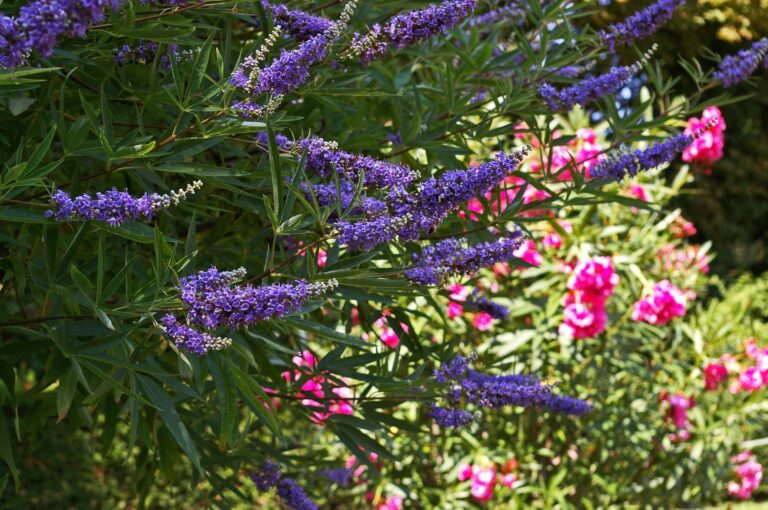It has long been known that monk’s pepper is good for horses and humans. But before scientists explored the full spectrum of the plant’s effects, its use was limited to a very specific area. The botanical name as well as numerous trivial names of the labiates plant reveal which area.
Monk’s Pepper As An Aroma Carrier With An Amazing Side Effect
The scientific term for monk’s pepper is Vitex agnus-castus. This contains the Latin word castus, which means “pure”. Its use is based on the habit of using the plant as a lust-inhibiting agent. This is also evidenced by epithets such as chaste lamb or chaste tree.
Findings about the amazing effect of the plant are already recorded in ancient monastic writings. Here the aromatic seeds of the fruits are recommended as a seasoning, but there are also references to the anaphrodisiac effect of the plant.
This dual benefit was doubly beneficial to the monks: on the one hand, the spicy aroma refined the monks’ meager meals; on the other hand, it curbed their libido – making it easier for the monks to lead an abstemious life. The popular name monk’s pepper vividly reflects this use.
Monk’s Pepper As A Lust-Inhibiting And Generally Strengthening Agent
The monks were not aware of what the effect of the deliciously beneficial seeds was based on, but they recognized that the household remedy could also be used in other ways. They recommended monk’s pepper to the farmers in the area to curb the reproductive instinct of horses and donkeys as well as sheep, cattle and goats.
At the same time they advised to treat preferably male animals, so that they become more sociable. For this purpose, not only the fruits and seeds of the plant were used, but also its leaves and flowers. And these produced a number of most welcome side effects when fed to the animals.
The monk’s pepper, which a horse or other animal had eaten, mitigated not only the stud instinct and the associated restlessness or aggressiveness – but also had a positive influence on:
- Obesity.
- Listlessness.
- Irritability.
- Muscle atrophy and
- brittle bones.
The totality of its effects made the plant a popular feed additive. In addition to owners of male and older animals, breeding and large stables also benefited from its many effects. However, researchers were late in discovering which substances in monk’s pepper bring the described benefits to horses.
Monk’s Pepper From A Scientific Point Of View
Today, plant and medical scientists know that all parts of the shrub-like plant contain
- Essential oils.
- Bicyclic diterpenes.
- Iridoid glycosides.
- Lipophilic flavonoids.
- Oleic and linoleic acids, and
- Triglycerides.
are present. Some of these components act directly on the pituitary gland – a part of the brain about the size of a pea that controls hormone production. It stimulates the body to produce various messenger substances; including endorphins for the feeling of happiness and oxytocin to fight pain.
In pubescent and adult organisms, the pituitary gland releases prolactin – the hormone that regulates libido and all related functions. It is responsible for:
- Erectile function.
- Ovulation.
- Milk flow.
- the urge to reproduce or raise young.
Drugs or herbal agents can alter prolactin levels. Monk’s pepper is known to have approximately the same effect in horses and humans. A sufficiently high dose lowers the hormone release to such an extent that various processes in the body are slowed down or even stopped.
Areas Of Application Of Monk’s Pepper In Equine Medicine
The properties of the plant can be used specifically to strengthen the well-being, general condition and health of your horse. Pay attention to high-quality products with BIO seal and prefer fresh goods or gently obtained extracts. Here, the valuable ingredients are more readily available for your four-legged friend than in highly processed dosage forms. Possible applications of monk’s pepper in the veterinary field are:
Monk’s Pepper To Increase Breeding Success
In both animals and humans, Monk’s Pepper has been shown to treat cycle disorders or increase conception. If you want your mare to carry a foal, the herb is a possible booster for breeding success; however, it should not be fed during pregnancy.
Monk’s Pepper Against Parasite Infestation
Among many other effects, the plant has been shown to have a repellent effect; meaning that ingesting monk’s pepper can protect a horse from mosquitoes, ticks and other bloodsuckers.
Monk’s Pepper For PPID
Monk’s pepper is also used in the supportive treatment of Equine Cushing ‘s Syndrome – ECS, Cushing’s or PPID for short. This hormone disorder mainly affects older animals and is triggered by too much good feed with too little exercise. The symptoms span a wide range and are worth exploring in more detail. You’ll learn more in a later post on horse health and care.
Monk’s Pepper Used In A Classical Way
Its importance as an anaphrodisiac remains unbroken to this day. In this function, the plant has proven itself especially with timid geldings. Their pronounced sexual and social drive makes integration into a herd difficult. Monk’s pepper can be used to prevent such a horse from jumping up and dominating. However, you have to be very careful about the necessary dosage – because too small doses can even increase the libido and intensify undesirable behaviors.
FAQ – Frequently Asked Questions About Monk’s Pepper For Horses
That was a lot – but by no means everything there is to say about the ingredients, effects and areas of application of monk’s pepper. To give each horse the optimal treatment, you should get detailed advice. As a refresher, here is a brief summary of the most important information:
What Is Monk’s Pepper?
Monk’s pepper is a shrubby plant with large dark green leaves and pastel-colored, highly fragrant flowers. It forms small blackish fruits that look like peppercorns and have a similar aroma.
How Does Monk’s Pepper Work?
According to the latest scientific knowledge, the complex ingredients of the plant act on the hormonal center of the brain. Here they regulate the release of prolactin – a sex substance that controls libido and numerous reproductive functions.
What Is Monk’s Pepper Used For?
Monk’s pepper can alleviate hormonal disorders in horses and humans; including states of weakness and degradation processes. In the veterinary field, the plant is used as a lust-inhibiting agent to facilitate the keeping of male animals.
What Should Be Considered When Buying Monk’s Pepper (Preparations)?
The products should come from organic production and have been processed as gently as possible. Ideally, you should use fresh monk’s pepper as the horse would find it in nature.
What Should Be Considered When Feeding Monk’s Pepper (Preparations)?
The dosage of monk ‘s pepper must be adjusted to the individual needs of the horse. Seek advice on this from an experienced veterinarian or herbalist.
What Alternatives Are There To Monk’s Pepper?
As a natural product with outstanding properties, monk’s pepper is virtually unrivaled for the horse. However, since its use requires certain knowledge, many veterinarians offer ready-to-use hormone preparations. Their advantage lies in simple dosage and efficacy that has been researched over many years.
Sources
www.maison-naturelle.de/blogs/maison-naturelle-blog/monchspfeffer-schon-bei-den-monchen-des-mittelalters-beliebt
www.mylife.de/heilpflanzen/moenchspfeffer/
www.navalis-vet.de/ratgeber/cushing-syndrom
www.pferderevue.at/magazin/gesundheit_medizin/2016/04/verbotene_liebe_problemfalldeckenderwallach.html
www.msd-tiergesundheit.de/produktliste/?product-category=hormone&species=horses





